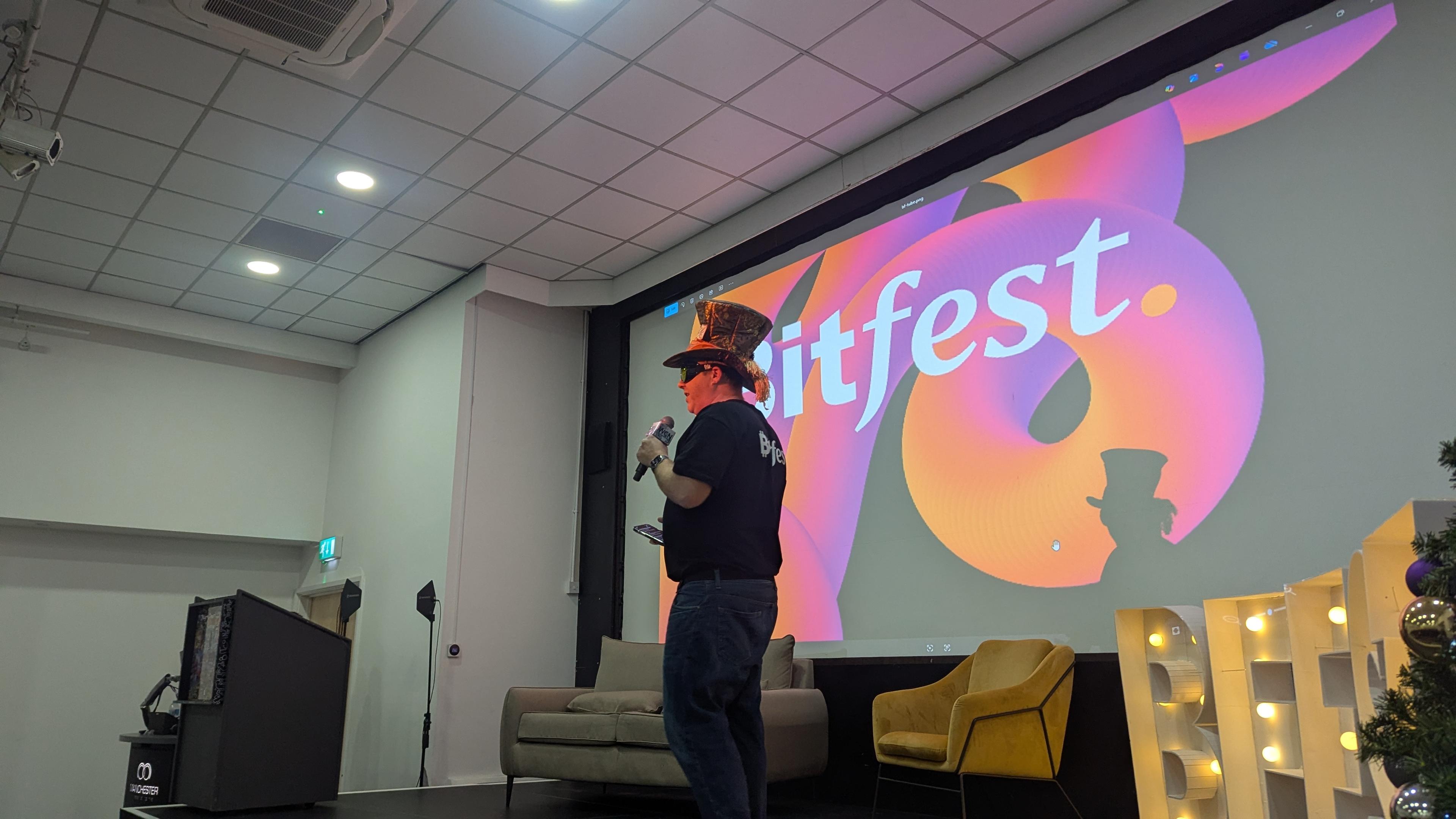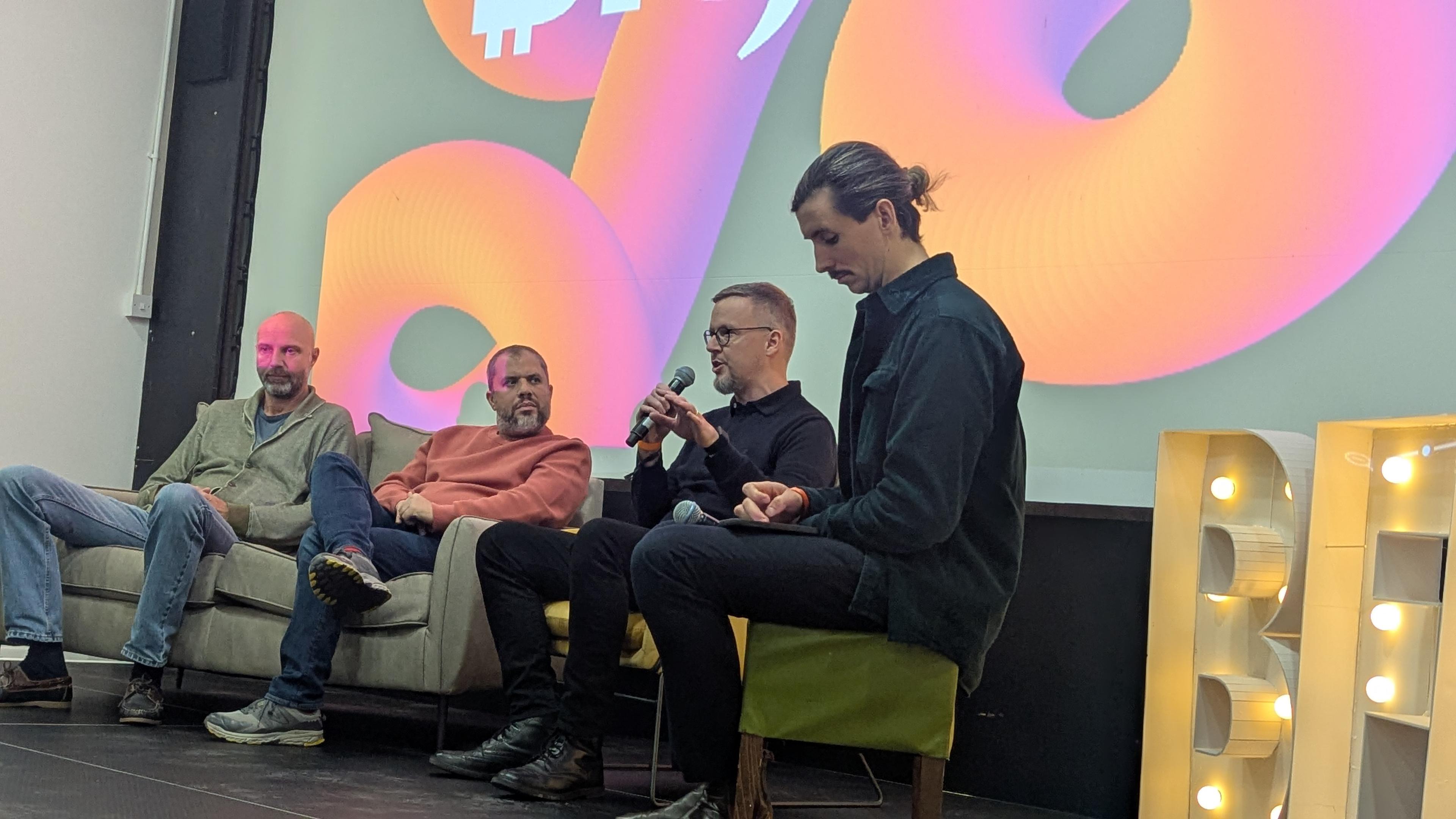2025-11-23 20:40:43
The conference is over now. I likely wouldn't have come for just a bitcoin thing, but I am very interested in redecentralizing the web, so it's attachment to the nostr day pulled me in.
Everyone I met was friendly and interesting and seems much more interested in making a better money system than in making money for themselves.
Our government and bank money systems are dysfunctional in all kinds of ways which are often less visible than they should be too people using them, especially to those in Europe and America who benefit from the way those systems exploit the global south.
I'm not convinced that fixing that would end wars and fix broken government as some seem to think, but I am sure our money is the source of many problems.
There are many bright, well meaning, and intelligent people building to improve bitcoin in fascinating ways with the hope of having a parallel system to transition to. With lots of work still to be done.
Can it work?
I'm sure I don't know, and I'm sure even if it's a better system it'll come with it's own unfairness and cruelty. Money will continue to be a source of suck and worry.
I'm told that the bigger conferences are often full of shitcoin scammers and suit wearing banksters who are in fact all in it too get rich and rip people off, but I found none of that here.
Here there is a real community of people trying to make the world a better place and improve the lives of their neighbours and governance of their countries.
And in the end building community is the most radical and effective way to change the world regardless of the problems of it's money system.
I had a great time. Thanks to those organising it.
#bitfest #bitcoin
2025-12-20 23:22:58
So in another dream I just woke up from, I was talking to someone about "the idea problem" (that it's becoming harder to monitize ideas, from a vox article written by an AI cooked reporter).
https://www.iheart.com/podcast/105-it-could-happen-here-30717896/episode/executive-disorder-white-house-weekly-46-313675864/
Basically, I was arguing that the majority of inventions target men because patriarchy puts economic control in men's hands. As men have started to help more with childcare, there have been more inventions related to childcare. (I don't have any idea if this is true. Seems legit, but I'm just relating my dream. I think I was also oversimplifying a bit to "men" and "women" because of my audience, but anyway it was a dream.) There's actually more low-hanging fruit, I pointed out, related to making care work easier.
So I argued that the real problem was a failure to invest in research into solving that problem. Today there are all these boondoggles built around killing people. What if, instead of all this government research into killing people, we dumped a ton of money into making it easier to support a household? That would be great for the economy. (Being asleep, I seem to have forgotten that working people need money.)
In the blur of being just awake I started thinking about how you could kickstart the US economy by taking the money from the AI boondoggle and other autonomous murder bots and create something like a program to build robots for housekeepers. You'd still be funding tech with government money, so the same horrible people get paid, but you're now actually solving real problems. It wouldn't even matter if it was a boondoggle, honestly. Just dumping money into something other than murdering people is good enough.
I imagined first if there was a program to fund a robot housecleaner, like robot dog with AI some laundry pickup, that would be provided, free of charge, to help people with children. It would work the same as the military boondoggle where a private company makes the government buy a piece of hardware from them and then also pay them to service it for some number of years. But instead of that hardware sitting around waiting to kill someone, it would be getting brought to people's houses to help them.
Then I thought, hey, you could even boost the economy more if you just had government funding for doulas and housecleaners and paid them a living wage. Hey, you could really kickstart the economy by nationalizing healthcare and including doula support as part of all births. Oh, and you could also just include the optional household help for families with children until the kids turn 18.
None of this is perfect (I don't actually think most of this is possible from any state), but the point is that it's actually wildly easy to figure out all kinds of ways to invest in the economy and monitize ideas as long as you aren't entirely focused on the same old "make money from spying on people and killing them." Funny that. Like they said in the podcast, maybe "finding ideas" isn't the problem.
Hope you enjoyed the weird semi-awake brain dump/rant.
2025-11-18 12:11:51
This is a subtweet...
People who are not anti-capitalist sometimes wonder: "Why is there a monopoly on X life-critical thing?" (E.g., epipens, insulin, web search).
This one is really simple actually: because monopolies are more profitable than competition, and the foundation of capitalism is that capital = power.
Various societies have recognized the necropolitical outcomes of monopolies and have tried to erect barriers to monopoly; we all know that monopolies are bad, death-and-suffering-causing things. But since these societies mostly remain capitalist, they allow these barriers to be eroded by the power of capital (to do otherwise would be to repudiate capitalism because it puts a limit on the power of money). The barriers are ineffective, and the capital = power equation holds, and monopolies result and get to do their killing & maiming thing (remember: even things like social media monopolies that you wouldn't expect to pay for political assassinations like a mining company still profit from inciting genocides). *Sometimes* there are oligopolies instead of monopolies, but instances of really competitive markets are pretty rare for things that are widely sought-after.
The "government will manage the markets to prevent bad outcomes like monopolies" strategy has failed repeatedly, spectacularly, and almost universally. To actually prevent monopolies you need a population that no longer believes that money should equal power, it's that simple. Sadly, it's actually not that simple, since all of the alternatives which equate something else to power, like "the king" or "party loyalty as judged by the supreme leader" have the same problems or worse. The attitude you need to cultivate is "nobody should have power," which is hard because *all* of the power-systems we have constantly propagandize against this attitude in myriad ways. Still, in the future once we've broken free of this age where hierarchy is accepted, people will look back and wonder whether the historical records are even credible given how much needless death and suffering were endured with little resistance.
#anarchy #capitalism
2026-01-24 18:12:48
Imagine there were no smartphones with cameras and social media, then ICE/DHS would completely get away with all their lies and misinformation. The federal government statements in the US feel like the Soviet-Union for those people old enough to remember that. Local media and civilian observers are doing a great job.
#minneapolis
2025-11-22 10:39:50
Despite much opinion to the contrary, the government money we use is crappy.
I'm at bitfest in Manchester to find out if Bitcoin could be a better money.
It could hardly be worse.
The mood is still good, people are joking about recent devaluation rather than crying. Those who aren't all in are trying to buy more at the discount.
After an introduction by Mad Bitcoins, Joe Bryan explains the problem with government money.
He imagines an island on which two types of money are tried, with a dividing wall between them.
When economic problems hit, government can just print more money on the fiat side. Everyone now using money which is worth less. Distorting prices, inflating asset prices, making the rich (who hold assets) richer and the poor (who have to pay inflated prices) poorer. Driving wealth inequality.
On the hard money side, government must tax properly. Take in more from the rich rather than inflating to take it from the poor. Reducing wealth inequality.
On the government money side, the wealthy monitize houses, stocks, resources. Saving in money is impossible, its inflated away. So they save in assets and hording resources. Capital is misallocated. The youth can't afford houses. Poverty traps are caused. The only way out is printing more for benefits. Making it all worse. More economic crises, more printing. More government debt.
Eventually, the wall is broken. Government money people can save in the hard money instead. It reduces the value of government money further. More printing. More inflation.
Eventually, war. Funded by printed money.
The dollar is the best of a bad bunch all other government money is falling in value even faster.
I wonder, is bitcoin really this better money though? It's limited, hard, and can't be printed without energy investment.
I'm still unsure that fixing money fixes the world.
--
Note: "crypto" is mostly more like government money than bitcoin. It can be printed indefinitely by it's makers, does not cost it's makers to print. Crypto is usually just a scam people to get more bitcoin. Bitcoin is not crypto.
#bitfest #bitcoin
2025-11-17 08:52:05
The implications are interesting enough when we apply this to systems like capitalism or national governments, but there are other very interesting implications when applied to systems like race or gender.
Like, as a cis man the only way I can be free to express and explore my own masculinity is if the masculinity I participate in is one which allows anyone the freedom to leave. Then I have an obligation to recognize the validity of nom-masculine trans identity as a necessary component of my own. If I fail to do this, then I trap myself in masculinity and allow the system to control me rather than me to be a free participant in the system.
But if it's OK to escape but not enter, that's it's own restriction that constrains the freedom to leave. It creates a barrier that keeps people in by the fear that they cannot return. So in order for me to be free in my cis masculine identity, I must accept non-masculine trans identities as they are and accept detransitioning as also valid.
But I also need to accept trans-masc identities because restricting entry to my masculinity means non-consensually constraining other identities. If every group imposes an exclusion against others coming in, that, by default, makes it impossible to leave every other group. This is just a description of how national borders work to trap people within systems, even if a nation itself allows people to "freely" leave.
So then, a free masculinity is one which recognizes all configurations of trans identities as valid and welcomes, if not celebrates, people who transition as affirmations of the freedom of their own identity (even for those who never feel a reason to exercise that same freedom).
The most irritating type of white person may look at this and say, "oh, so then why can't I be <not white>?" Except that the critique of transratial identities has never been "that's not allowed" and has always been "this person didn't do the work." If that person did the work, they would understand that the question doesn't make sense based on how race is constructed. That person might understand that race, especially whiteness, is more fluid than they at first understood. They might realize that whiteness is often chosen at the exclusion of other racialized identities. They would, perhaps, realize that to actually align with any racialized identity, they would first have to understand the boot of whiteness on their neck, have to recognize the need to destroy this oppressive identity for their own future liberation. The best, perhaps only, way to do this would be to use the privilege afforded by that identity to destroy it, and in doing so would either destroy their own privilege or destroy the system of privilege. The must either become themselves completely ratialized or destroy the system of race itself such being "transracial" wouldn't really make sense anymore.
But that most annoying of white person would, of course, not do any such work. Nevertheless, one hopes that they may recognize the paradox that they are trapped by their white identity, forced forever by it to do the work of maintaining it. And such is true for all privileged identities, where privilege is only maintained through restrictions where these restrictions ultimately become walls that imprison both the privileged and the marginalized in a mutually reinforcing hell that can only be escaped by destroying the system of privilege itself.
2025-12-01 18:42:40
So the temporary placeholder name "Your Party" is made permanent.
None of the options on the shortlist were good. Most of them just as grammatically inconvenient as the dumb placeholder name.
The people who decide on the short-list, who can be a member, whose votes counts and what the options are, have quite a lot of power.
Zara Sultana boycotted day one over who sets the rules and who can be involved. If Your Party have a governing body with power to override conference they end up like the Labour party and just are easily taken over and usurped by a cabal of thatcherite neoliberal capitalists.
They did allow the dual membership system and a wider governance, so Zara won on who gets to be a member and who gets to be in charge. Which is probably good.
Coz as the terrible name shows, if you put the idiots in charge you'll get idiocy not good collective decision making.
For now the membership appear to have won, and I hear are they are all very excited and fierce and canny and not likely to let the old guard just set up another dictatorship from the top.
They currently have half the membership count of the greens, less than a quarter that claimed by Reform. Lets hope they can get some attention towards something other than how billionaires think the country should be run and focus on the people.
Here's hoping they can inflate that number by draining the Labour party and Reform members who just want change really rather than actually liking anything said by Farage.
#yourParty #ukpol
2025-12-03 17:17:43
If only there were some clue about why the Democrats keep losing to Trump…
…It couldn’t possibly be that denying the basic humanity of Palestinians and going all in on genocide doesn’t resonate with people who aren’t fascists, could it? https://mastodon.social/@QasimRashid/1156562588…
2025-11-22 10:59:21
A panel of people from a few different countries.
The UK, where the event is, and the US currently have money which perhaps is good enough that the people there don't see much need to replace the money. Running global reserve currency helps exploit other poorer countries. The problems are fairly invisible.
But in other countries, poorer countries with even worse money, countries more exploited by debasement of the global reserve currencies, the problems with government money are more evident. They see the need for an alternative more strongly.
Adoption is important though. Money is only money if it's widely accepted. So given the choice of more users or higher price, the panel would all pick more users.
#bitfest #bitcoin
2026-01-08 18:26:26
The fascist who killed Heather Heyer at Unite the Right helped turn the tides against the last Trump administration. He said there were "very fine people on both sides." The resistance grew, antifa doxxing fascists started getting those fash fired.
But some of those fash didn't stop. They kept organizing their terror cells. The fash who killed Heyer was with a group called Vanguard America. Patriot Front is a Nazi group that split off from Vanguard America. They started terrorizing people by loading up in box trucks and piling out for spontaneous marches.
That box truck tactic probably sounds familiar. Patriot Front basically disappeared at the same time that ICE started recruiting hard.
Let me make it more clear. The very same Nazis from UTR who killed Heather Heyer, who Trump called "very fine people," are now employees of DHS. They've been carrying out the ethnic cleansing they always dreamed of, and they're being paid by the government, *with your tax dollars*, to do it. And now, just like in Charlottesville, they've murdered an unarmed protestor.
This feels similar because it is. These are the same people killing daughters and mothers. Killing unarmed protestors, out of rage not fear, then lying and claiming self defense. This is the same tactic it's always been. This is the same thing they've always done.
It seems like we may have reached the Heather Heyer point of this administration early with Renee Good. Now would be a good time for everyone to get into the streets and stay there until this is over. Everyone turned the tides before, and now he's so much weaker.
This can all be over if we fight like hell to end it.
#USPol


